by Phil York, Act Locally Waco Housing and Homelessness Policy blogger
In the Act Locally Waco blog post on May 18, we introduced information about a bill called The U.S. House of Representatives Fiscal Year 2015 Transportation Housing and Urban Development (THUD) bill (HR 4745). In this post, I would like to give you an update on the status of that bill, and also explain how this bill directly affects our goal of reducing homelessness in Waco.
The importance of McKinney-Vento Homeless Assistance Grants
A key element of the THUD bill that directly affects Waco is funding for McKinney-Vento Homeless Assistance Grants, in particular the Continuum of Care program. (For an excellent description of this program from the National Alliance to End Homelessness, click here.) According to the most recent update on the Mayor’s 10-Year Plan to End Homelessness, agencies and organizations who work with homeless people in Waco have been able to reduce chronic homelessness in Waco by two-thirds since work on the plan was initiated in 2005. The funds Waco has received via the Continuum of Care Grant program have been foundational to the successful implementation of the plan so far, and continued funding will be necessary for on-going success.
In 2013, for example, our Waco community received over a million dollars ($1,040,292 ) through this competitive grant program. Almost all of the money ($977,639) received from this grant went directly to fund needed programs administered by some of the most well-respected non-profits and agencies in Waco, specifically:
- Compassion Ministries (1 program)
- Mission Waco (1 program)
- The Family Abuse Center (3 programs)
- The Heart of Texas Region MHMR (2 programs), and
- The Salvation Army (1 program)
The remainder ($62,653) went to pay for the administration of our Homeless Management Information System (HMIS). This is the software that allows us to measure participation in our programs for homeless people and to identify patterns in usage of various services. It is our best source for the information we need to track our progress and to make sure we are working together as efficiently and effectively as possible.
According to the research done in connection with the Mayor’s 10-year Plan to End Homelessness, each chronically homeless person in Waco was costing the city $39,000 in 2005. Best estimates suggest that with the help of the Continuum of Care grant funds, we have reduced the number of chronically homeless people in Waco from 97 (at a cost of $3,783,000 per year) to 32 ($1,248,000 per year). In other words for a $1,040,292 per year Continuum of Care investment, we are generating $2,535,000 per year worth of benefit. And those figures only consider what we have been able to accomplish regarding chronic homelessness; they do not take into account the progress that has been made regarding other kinds of homelessness thanks to Continuum of Care funding.
What does HR 4745 mean to Waco?
President Obama’s proposed 2015 budget included $2.145 billion for Homeless Assistance Grants, a $300 million dollar increase. The House version of the appropriation (HR 4745), proposes keeping the funding at 2014 levels, $2.105 billion.
According to the National Alliance to End Homelessness (NAEH), remaining at 2014 funding levels would be bad news for communities like Waco who depend on money from the Continuum of Care Grant. As the NAEH explains on their website, “Due to expiring multi-year grants and increased renewal demand, the $2.105 billion funding level for McKinney that passed through the House would result in funding cuts to Continuums of Care. If this funding level is enacted, communities will be required to once again make the difficult tiering and prioritization decisions they made for the FY 2013 NOFA (Notice of Funds Availability).”
Where is the Bill Now?
According to Govtrack.us, this bill passed in the House on June 10, 2014 and goes to the Senate next for consideration.
What Can I do?
Remain informed: The most important call to action is for us to remain informed about the current policy landscape. Regardless of your political background or interest, we share common ground in the preservation and long term health of Waco. You can follow the work of the US Committee on Appropriations by visiting their website: http://appropriations.house.gov/news/. Another useful site for keeping track of legislation is Govtrack.us. This site gives a step by step graphical guide on where policy is within the legislative process.
Speak up: Contact your U.S. House representative and your U.S. Senators. Let your representatives know that the McKinney-Vento Homeless Assistance Grants, and in particular the Continuum of Care Grants, are making a tremendous difference in the Waco community. The money being spent has directly resulted in reducing homelessness, and it is an investment that saves money both immediately and in the long run. Feel free to use points raised in this blog post as talking points in your correspondence. If your Representative is Mr. Bill Flores, you have the convenience to contact Rep Bill Flores directly via email (https://billflores.house.gov/contact/ ). The U.S. Senators from Texas are John Cornyn and Ted Cruz, click on their names to find out how to contact each of them.
Connect directly to the mission: There are volunteer and giving opportunities at each of the nonprofits listed in this blog post. Connect directly to the work that is reducing homelessness and making Waco a better place to live for all of us.
Special thanks to Jennifer Caballero, Lead Program Analyst – HMIS, City of Waco, for her technical assistance in this blog post research.
 Phil York, Director of Development at Waco Habitat for Humanity, is a self-described “policy nerd;” he is also the Act Locally Waco housing and homelessness policy blogger. You can direct questions to Phil to [email protected]. Would you be interested in blogging for Act Locally Waco? If so please email [email protected].
Phil York, Director of Development at Waco Habitat for Humanity, is a self-described “policy nerd;” he is also the Act Locally Waco housing and homelessness policy blogger. You can direct questions to Phil to [email protected]. Would you be interested in blogging for Act Locally Waco? If so please email [email protected].
When my 13-year-old son came home from school one day last year and told me he and some friends had formed a rock band, I was skeptical. We had tried violin lessons in third grade and guitar lessons a few years later — and bought all the equipment that goes with it. But it wasn’t until he found his own path to music with friends that he started having fun and wanting to spend his spare time practicing his instrument.
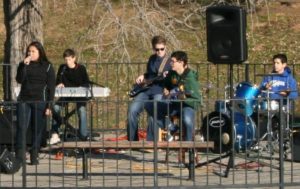 The band is made up of Jackson Anderson (lead guitar), Spencer Davis (keyboard), Analisa Villarreal (lead vocals), George Eichenberg (bass) and John Paul Bustamante (drums). They have taken the name “26th Street” because they practice in John Paul’s grandparents’ garage on 26th Street in Waco. They play everything from classic rock to modern to country.
The band is made up of Jackson Anderson (lead guitar), Spencer Davis (keyboard), Analisa Villarreal (lead vocals), George Eichenberg (bass) and John Paul Bustamante (drums). They have taken the name “26th Street” because they practice in John Paul’s grandparents’ garage on 26th Street in Waco. They play everything from classic rock to modern to country.
With the birth of 26th Street, I started to see less TV time and more creativity flowing — and with that I saw a sense of accomplishment, pride and a love of something all his own. He was excited to show me the more complicated bass line of “Hotel California,” which he had spent hours perfecting. And I was hearing the same from the other parents.
They began playing at some friends’ birthday parties and at a local yogurt shop, where they had a friend willing to let them play on the patio for tips.
 As they worked and got better, crowds of cheering friends and family showed up to watch them play. Eventually even folks who weren’t there just to be nice started showing up. Then, they started getting paid gigs at places like El Chico, who promoted them with posters and emails. People started asking them for photos, business cards and Facebook page, which they now have. They are making money, coordinating their own schedules, working with business owners and learning to be responsible and deliver a quality product: their music. Their summer is sprinkled with gigs that include everything from a quinceanera to a museum fundraiser — and they love contributing to the local music scene.
As they worked and got better, crowds of cheering friends and family showed up to watch them play. Eventually even folks who weren’t there just to be nice started showing up. Then, they started getting paid gigs at places like El Chico, who promoted them with posters and emails. People started asking them for photos, business cards and Facebook page, which they now have. They are making money, coordinating their own schedules, working with business owners and learning to be responsible and deliver a quality product: their music. Their summer is sprinkled with gigs that include everything from a quinceanera to a museum fundraiser — and they love contributing to the local music scene.
One of the best parts is that the Waco community has been very welcoming. The band has played at El Chico, Slippery Minnow, Valley Mills Vineyard, The Gin in Belton and other parties and events. In May, they were named the Music Association of Central Texas’ “Horizon” award winner for up and coming artists.
The band practices once a week in the garage on 26th street, and I think the kids look forward to this time together, creating, collaborating, and making music. As a parent, I can’t think of anything I’d rather my kid be doing. And the funny thing is, it was all their idea, not ours. The parents provide support – sometimes lots of support – but the kids and their music are in the driver’s seat.
The other 26th Street parents and I are proud of our kids. As Erin Davis, mom of Spencer Davis, the keyboard player, says. “It’s deeply rewarding to see our kids work so hard and be recognized in the local music scene.” They are building up a sense of responsibility and self-worth. They are taking risks. They are making a personal investment in something they care about. They are learning habits and skills that will serve them well throughout the rest of their lives. One of the most important skills they are learning is how to make their own fun!
Waco and other towns our size can sometimes suffer from a general misperception, especially regarding young people, that “there’s nothing to do.” One thing that 26th Street can teach all of us is that there is always something to do if you know how to make your own fun. In fact, the fun you make yourself can be better, and better for you, than the fun that is delivered ready-made. Imagine how much more fun our kids are having being in a band than they would ever have just by paying to go see bands. Imagine how much more benefit they are getting from this experience.
Whether it’s music or something else, there are lots of things kids can do in Waco to have fun, get involved in the community, make friends, learn crucial life skills and even in some cases earn some money: start a band, start a business, find some regular volunteer “employment.” Parents, this will take some subtlety on your part, but try not to buy in if you hear your kids saying, “there’s nothing to do.” Find a subtle way to suggest, inspire and encourage something – and let them run with it. Then – when they are running – cheer like crazy and invite your friends and the whole community to do the same.
 Gretchen Eichenberg is a life-long Wacoan and local high school newspaper and yearbook adviser. There’s nothing she’d rather be doing more than cheering on her favorite softball player or jamming to the tunes of her son’s band. Her family includes husband, Alex, and kids George, 14, and Brigitte, 11, and an energetic Lab named Luke, who thinks he rules the HOT Dog Park.
Gretchen Eichenberg is a life-long Wacoan and local high school newspaper and yearbook adviser. There’s nothing she’d rather be doing more than cheering on her favorite softball player or jamming to the tunes of her son’s band. Her family includes husband, Alex, and kids George, 14, and Brigitte, 11, and an energetic Lab named Luke, who thinks he rules the HOT Dog Park.
by Ryn Farmer
Each year, nearly 9 million dollars are drained from the Waco economy because of excessive fees charged by predatory lenders.
Recently, a documentary came out called “Spent: Looking for Change.” It follows the lives of four different families who are struggling to get by and end up using payday loans and auto title loans to help supplement their income. One of the individuals in the documentary states, “It’s not an irrational choice. It’s just not a productive choice… and it’s a costly choice.” And sometimes working families do not have any other option. You can watch “Spent” by clicking here.
Payday loans and auto title loans emerged in the 1990s. They were developed as a way to provide small cash advances to individuals who had poor credit and could not get a loan from a financial institution. Gary Rivlin with AlterNet writes, “By 2006, the payday loan was a $40-billion-a-year industry with more storefronts scattered around the country than the combined numbers of McDonalds and Burger King, each offering a kind of fast-food finance to the working poor at annual interest rates as high as 500 and 600 percent, depending on the state.” (“Meet the Man Who Made a Fortune Exploiting the Poor With Payday Loans”)
This issue has garnered much conversation, both in the state of Texas and in Waco, over the past several years. In many other states payday and auto title lenders are highly regulated, but in Texas few regulations exist to keep these entities in check. Because of the lack of regulation, there has been a tremendous growth of payday lenders in Texas. They use coercion to reel in consumers and then extort them by keeping them in a tangled web of debt through excessive fees and multiple refinances of the loan.
Under the current state law:
- No limits on fees
- No limit on interest rates
- No limit on the size of the loan
- No limit on rollovers or refinances
- No limits on ability to repay based on income
The impact on consumers is devastating. In Texas, the loan rate can be upwards of 500% APR. The average amount borrowed in Texas is $500 for a payday loan and $800 for an auto title loan. The average payday borrower in Texas pays $840 for a $300 loan. Many payday borrowers take out additional loans to cover previous loans resulting in a vicious cycle of debt. In the greater Waco area, there are 65 storefronts and 55% of consumers refinance their payday loan (Citizens for Responsible Lending, 2014; Texas Appleseed, 2013).
All of this seems absolutely ridiculous, right? So how is it legal? The diagram gives a short explanation. The consumer pays the money to the Credit Service Organization (CSO) or the Credit Access Business (CAB), which is the storefront, and only interacts with them. The storefront (the CSO/CAB) is unregulated in Texas and can charge any amount they want in fees. The lender (usually a bank) provides the loan capital at a 10% interest rate to the CSO/CAB and the lender does not have a direct relationship with the consumer. The consumer pays the 10% interest plus the additional fees that the CSO/CAB adds to the loan.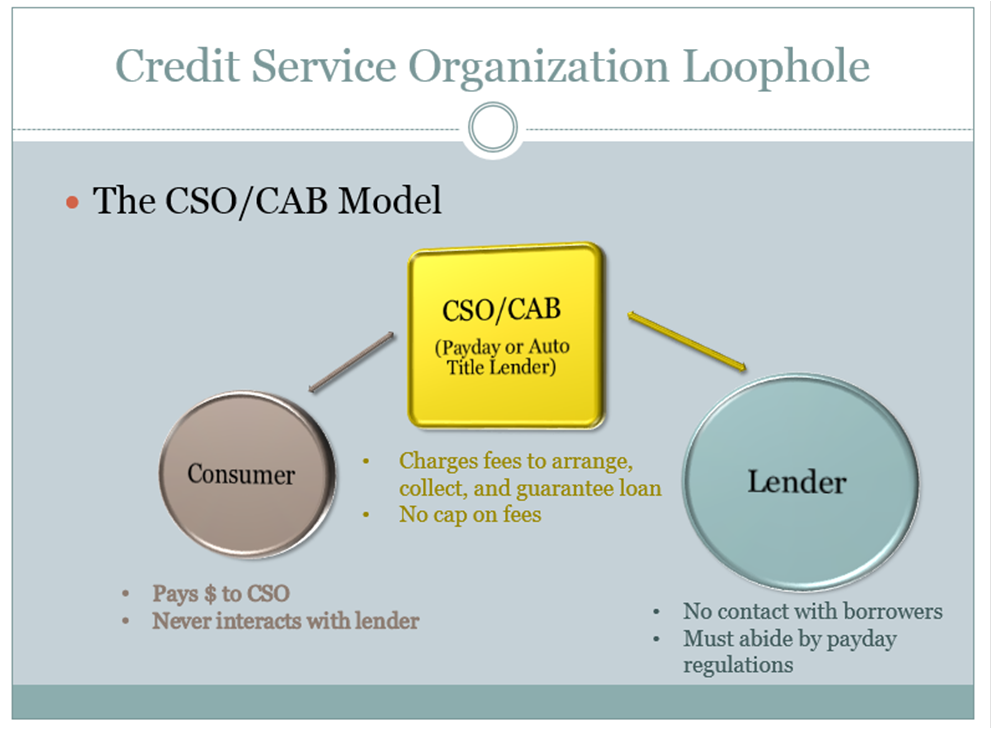
A woman from Waco tells her story about using a payday lending service after experiencing some unforeseen difficulties: “My husband was injured at his work place and had to go on disability. That meant we were on a fixed income. I started with a cash store because I saw an ad on TV. I got $300. Every 2 weeks there was a repayment due. I would pay $67 or $70 in fees to refinance the loan. I’m on a part time income. I have paid $150 in interest and I still owe $300. Because I couldn’t pay it back I got another one and another and another one to pay back my other loan. My husband also took out 4 other loans. After a year of this they let me break down the loan into 4 payments, but you have to ask for this plan. They don’t advertise it, and you have to qualify. We barely had enough money for food… I closed my bank account and stopped paying on the loans. I know it’s probably on my credit report. If you’re going to do work with legislation you should tell them to offer payment plans to customers. The payday lenders don’t tell their customers about that option. It would help to have payment plans instead.”
Little is being done at the state-level to address these concerns. There has been a push in the state of Texas to pass ordinances at the local city level and to create ethical alternatives. So far, 18 Texas cities have passed ordinances to limit payday and auto title lenders. Waco has worked to address this in the past and is currently ramping up efforts. However, few viable alternatives exist in Waco so far.
Citizens for Responsible Lending is a group of individuals from a variety of sectors in Waco who have formed several task teams to work on addressing predatory lending. They are looking at what type of ordinance could be passed within our city and in the greater Waco area to limit payday and auto title lenders. They are also seeking to develop an alternative to these negative business practices that exploit our citizens. If you are interested in joining Citizens for Responsible Lending or would like more information about this issue, please contact Ryn Farmer or Alexis Christensen at 254.235.7358 or email them: [email protected] or [email protected].
 This Week’s Act Locally Waco Blog post is by Ryn Farmer. Ryn is a Community Organizer at the Waco Community Development Corporation (Waco CDC). Waco CDC helps to inspire and cultivate healthy neighborhoods. They consider a healthy neighborhood to be one that is safe, clean, and diverse; one in which it makes economic sense for people to invest and one where neighbors manage change successfully. If you would be interested in writing for the Act Locally Waco blog, please send an email expressing your interest to [email protected].
This Week’s Act Locally Waco Blog post is by Ryn Farmer. Ryn is a Community Organizer at the Waco Community Development Corporation (Waco CDC). Waco CDC helps to inspire and cultivate healthy neighborhoods. They consider a healthy neighborhood to be one that is safe, clean, and diverse; one in which it makes economic sense for people to invest and one where neighbors manage change successfully. If you would be interested in writing for the Act Locally Waco blog, please send an email expressing your interest to [email protected].
by Ashley Bean Thornton
I got chewed out this week over something I wrote in an Act Locally Waco blog post. I don’t like being chewed out – who does? The chewing out wasn’t by someone who disagreed with me. In fact, I think my chewer-outer and I, when all is said and done, want the same thing. It wasn’t personal. I don’t even know my chewer-outer. His comments were delivered over the internet, and when I tried to respond through email, the email bounced. Also, it wasn’t something I could easily dismiss – it was a very well-written, articulate (though biting) chewing out that made several important points. So, I’m left to ruminate over this chewing out. I keep finding my way back to it in my mind and picking at it. I feel bad, but I don’t know how to fix it. I’m having trouble letting it go.
As it happens, the chewing out was triggered by one of the recent blog posts about the need for more public transit in Waco, but the particular subject is not important. I don’t think I got chewed out because I’ve been advocating for buses to come around more frequently. I think I got chewed out because I wrote something that to my White, privileged ears sounded fine, but that felt demeaning and dismissive to someone else. Now, looking back over the words I wrote with the fresh insight provided by the chewing out, I can see why they felt demeaning. That was certainly not my intention. I am sorry I was not more sensitive to how my words would come across to someone who lives with the day to day stresses of a life much less convenient and comfortable than my own.
I wish I could promise I would not make the same mistake again, but I can’t. I have learned in the last few years that community work, for me at least, is emotionally dangerous work. This is not the first time that – with all good intentions — I have said or done something insensitive. It’s not the first time I’ve been chewed out. I hurt someone else’s feelings; they hurt my feelings; we all end up feeling mad or discouraged or both. I don’t like it, but I don’t know how to fix it. Maybe you are better at this than I am, but sometimes – even when I feel like I have gone to great lengths to be careful — I still end up making someone mad. I could just keep quiet I guess, but that doesn’t always feel like a good option either.
To accomplish anything great in our community, we have to work together, and to do that we have to communicate. But, communication is hard. It can be especially hard between people with difficult lives and people with comfortable lives, between people with little money and people with plenty of money, between People of Color and White people. Sometimes it feels like every word is loaded with guilt and anger and frustration and impatience. Sometimes it feels like –rather than looking for ways to help each other – we are just waiting for chances to pounce on each other. Sometimes we are running mighty low on the “oil” required to give each other the benefit of the doubt. And, like in a car engine that is running low on oil, sometimes our surfaces grind and get overheated when they touch.
Yesterday, I ran across this ancient comment from Aristotle that seems to apply: “There is only one way to avoid criticism; do nothing, say nothing, and be nothing.” Gee thanks, Aristotle. I still feel lousy, but at least now I know I can look forward to more of the same. Because, crummy as it feels sometimes… and bad as I am at it sometimes… doing something is still better than doing nothing.
 This Act Locally Waco blog post is by Ashley Bean Thornton, the Manager of the www.www.actlocallywaco.org website and the editor of the Friday Update newsletter. The Act Locally Waco blog publishes posts with a connection to these aspirations for Waco. If you are interested in writing for the Act Locally Waco Blog, please email [email protected] for more information.
This Act Locally Waco blog post is by Ashley Bean Thornton, the Manager of the www.www.actlocallywaco.org website and the editor of the Friday Update newsletter. The Act Locally Waco blog publishes posts with a connection to these aspirations for Waco. If you are interested in writing for the Act Locally Waco Blog, please email [email protected] for more information.
By Erin Venable, Marketing Director, Waco Transit
Thank you, Laura White, for your recent foray into Waco’s public transportation system! Your recent blog post helped shine some light on why a robust public transportation system is so very important for our community.
You are correct in your conclusion that riding the bus can be time-consuming – we would love to increase the number of vehicles we run to decrease the wait and route time. However, until we receive an increase in funding, we are limited in what we can offer. Additionally, we are working hard to serve a rapidly expanding urban area with our already stretched-tight resources. We hope that stories like yours will help raise community awareness and public will to support that much-needed investment.
As for your experience riding our buses, I am sorry it was not as pleasant as it could have been. I want to make sure that you and our other Waco riders know about the services we offer that can help make using our current system easier.
Because we recognize that riding a city bus for the first time (and navigating the routes/time points) can indeed be intimidating, we offer free travel training upon request. In this training we take individuals or groups through the ins and outs of reading a bus map, planning a route, tracking the bus, and actual boarding and disembarking from the vehicle. We work with many local schools, social service organizations, and other community partners to make riding the bus as easy as possible for those who want to take advantage of our system. (If you are interested in arranging such a class for your group or organization, please email Denise Rodriguez at [email protected].)
 Additionally, one new development we recently rolled out is our free GPS app, which allows riders to track the buses as they move along the routes. The Ride Systems app can be downloaded on any smart phone, and users can see the route in its entirety, where the bus is currently, and the expected time of arrival for the main stops along the route. We feel like this has revolutionized the bus riding experience in Waco, and we have been working since our January roll-out to market the fact that this tool is available. (If you would like to track the routes via your desktop computer, please visit www.ridewaco.com .)
Additionally, one new development we recently rolled out is our free GPS app, which allows riders to track the buses as they move along the routes. The Ride Systems app can be downloaded on any smart phone, and users can see the route in its entirety, where the bus is currently, and the expected time of arrival for the main stops along the route. We feel like this has revolutionized the bus riding experience in Waco, and we have been working since our January roll-out to market the fact that this tool is available. (If you would like to track the routes via your desktop computer, please visit www.ridewaco.com .)
We do have some exciting plans in the pipeline that we feel would address many of our current challenges, but we need the public to rally around public transportation and encourage the powers-that-be to increase funding so that we can make needed changes and improve public transportation in this city. While we are thankful to have the support of many city and community leaders, we need citizens to speak up and make their requests known in our Downtown Transportation Study surveys, our MPO meetings, and wherever else you have a voice.
We would love to hear from you! Visit www.wacotransitsystem.com to fill out a Downtown Waco Transportation Study survey.
Also, The Waco Metropolitan Planning Organization (MPO) is in the process of identifying transportation needs for Metropolitan Waco through the year 2040. They have invited all interested people to make their priorities known. You can submit feedback in writing until June 15. Suggestions may be submitted by fax at (254) 750-1605, by e-mail to [email protected] or by mail directed to Christopher Evilia at the following address: Waco Metropolitan Planning Organization, P.O. Box 2570, Waco, Texas 76702-2570. Please take a moment to urge them to make improving public transportation a priority. Transportation is an important issue for all of us!
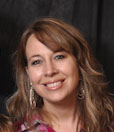 This Act Locally Waco blog post was written by Erin Venable. Erin, a Waco native, is the Marketing Director at Waco Transit. In addition to her work at Waco Transit, she also moonlights as a mother of five (ages 5 – 13) and serves on the Keeping Your Sanity board. Erin and her family are preparing to move to Cameroon via Antioch Ministries International and the Medical Centers of West Africa, where she hopes, among other things, to continue dialoguing about her beliefs and passions. If you would like to write for the Act Locally Waco blog, please contact Ashley Thornton by email at [email protected].
This Act Locally Waco blog post was written by Erin Venable. Erin, a Waco native, is the Marketing Director at Waco Transit. In addition to her work at Waco Transit, she also moonlights as a mother of five (ages 5 – 13) and serves on the Keeping Your Sanity board. Erin and her family are preparing to move to Cameroon via Antioch Ministries International and the Medical Centers of West Africa, where she hopes, among other things, to continue dialoguing about her beliefs and passions. If you would like to write for the Act Locally Waco blog, please contact Ashley Thornton by email at [email protected].
 by Cheryl Allen Resource Coordinator for VOICE
by Cheryl Allen Resource Coordinator for VOICE
I recently began working for VOICE (Viable Options in Community Endeavors), a nonprofit that serves sixteen counties, including McLennan and its neighbors. Before joining the staff, I was aware of VOICE’s existence, but not exactly what they did. Turns out, I was not alone in that lack of knowledge. Several friends and colleagues have asked me to clarify the role that VOICE plays locally. I am happy to explain! Here are six things everyone should know about VOICE:
1. We offer successful programs. – The purpose of VOICE is to strengthen families and help young people lead healthy and productive lives. We offer fourteen programs that approach this goal in a variety of ways. In some programs, such as our Curriculum-based Support Groups and “Project Toward no Drug Abuse,” we work with young people to help them develop the self-control and sound decision-making strategies to resist drugs. We also have programs such as La Voz Para Familia and the Strengthening Families Program in which we work with whole families to create an environment where children and youth can thrive. The Department of State Health Services (DSHS) grants under which we operate require that we use curricula that have been assessed and demonstrated to be effective. For a list of VOICE programs and the counties in which they are offered, click here: VOICE programs.
2. We change lives…lots of lives. – I have seen first-hand the difference that our programs make in individuals, families and communities. Our funding sources require us to be very diligent in reporting who we have reached, how we did it and the outcomes of our efforts. In fiscal year 2013, we touched 25,000 lives in McLennan County alone.
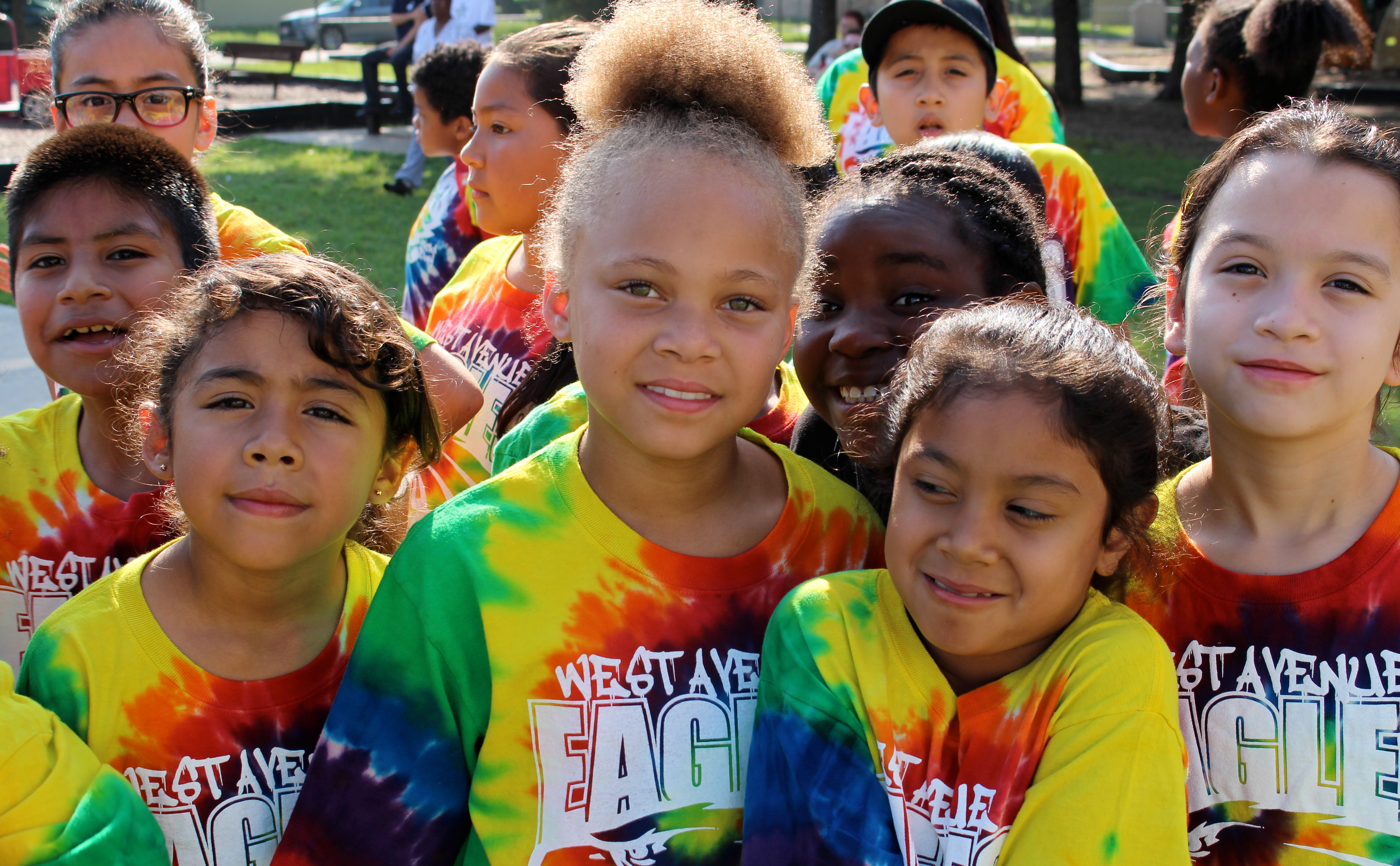 3. We are an autonomous organization with a successful history. – VOICE began in Corsicana in 1992 as the dream of Lois Hart, a retired educator who was passionate about helping children and youth. This grassroots beginning allows us to be autonomous, and we can tailor our programs to meet the needs of each community that we serve. Because of our successful history, in 2010 we were asked by the Department of State Health Services (DSHS) to include Region 7 (Bosque, Coryell, Falls, Freestone, Hamilton, McLennan and Milam) in our service area.
3. We are an autonomous organization with a successful history. – VOICE began in Corsicana in 1992 as the dream of Lois Hart, a retired educator who was passionate about helping children and youth. This grassroots beginning allows us to be autonomous, and we can tailor our programs to meet the needs of each community that we serve. Because of our successful history, in 2010 we were asked by the Department of State Health Services (DSHS) to include Region 7 (Bosque, Coryell, Falls, Freestone, Hamilton, McLennan and Milam) in our service area.
4. We play well with others. – VOICE’s philosophy is that working with local nonprofits, schools and churches increases the impact that we can make in a community. With that philosophy in mind we actively seek and maintain partnerships. For example, we are very proud that we have recently become a Waco-McLennan County partner agency. Also, we received funding to form the VOICE Against Substance Abuse Coalition (VASA Coalition) to work with stakeholders throughout McClennan County to implement environmental prevention strategies that will reduce the use of alcohol, marijuana and prescription drugs. Please contact me if you would like to learn more about our partnerships or the VASA Coalition.
5. We have funding to accomplish our goals. – In 2013, we received ten five-year grants totaling 2.6 million per year (1.4 million for Region 7). To qualify for the funding, we must raise five percent in matching funds from each region; thankfully, we are allowed to count volunteer hours and in-kind donations as part of that match!
6. We have diverse, dedicated and well-trained staff. – We have twenty-eight program staffers and five administrative employees for our sixteen-county area. Our staff reflects the demographics of the populations that we serve, and we receive extensive training on an ongoing basis.
If you would like to learn more about VOICE, please contact me. I am very excited about the work that we are doing and am more than happy to visit about it! I can be reached by phone at 254-855-2259 or by e-mail at [email protected].
 This Act Locally Waco blog post was written by Cheryl Allen. Cheryl has served the community professionally and as a volunteer for many years. She is the Resource Coordinator for VOICE and is an adjunct lecturer in Civic and Community Service at Baylor University. If you would be interested in writing a post for the Act Locally Waco blog, please email [email protected].
This Act Locally Waco blog post was written by Cheryl Allen. Cheryl has served the community professionally and as a volunteer for many years. She is the Resource Coordinator for VOICE and is an adjunct lecturer in Civic and Community Service at Baylor University. If you would be interested in writing a post for the Act Locally Waco blog, please email [email protected].
By Ashley Bean Thornton, Act Locally Waco
My mom was a librarian – or maybe she still is a librarian. She’s retired, but I’m not sure you ever really stop being a librarian. Because she was my school librarian for a while when I was in elementary school I enjoyed a great many advantages. For one thing, there was a limit on how many books children could check out at one time, but since I was the librarian’s daughter I sometimes got to check out MORE! Also, I could sometimes keep them LONGER without having to pay the fine. Yes, it was unfair – you are justified in your outrage. If it makes you feel any better, I have paid plenty of library fines since because of the bad habits I developed as a child.
 One of the other (less morally questionable) advantages of being the librarian’s kid was that I always, always, always participated in summer reading club. Every year the librarians at the public library would cook up a theme for summer reading club. It would be something like “Join the Reading Circus” or “Race to Reading.” The first week of summer they would lay out a long butcher paper “track” on a table next to the circulation desk. It would be marked off with a starting line and then sections according to how many books the participants might read – 5 books, 10 books, maybe even up to 50 books! When you signed up for reading club, in “Join the Reading Circus” year, for example, you would get to pick out a little plastic lion or elephant or dancing horse and put your name on it. When you checked out your first books, you got to put your little plastic avatar on the starting
One of the other (less morally questionable) advantages of being the librarian’s kid was that I always, always, always participated in summer reading club. Every year the librarians at the public library would cook up a theme for summer reading club. It would be something like “Join the Reading Circus” or “Race to Reading.” The first week of summer they would lay out a long butcher paper “track” on a table next to the circulation desk. It would be marked off with a starting line and then sections according to how many books the participants might read – 5 books, 10 books, maybe even up to 50 books! When you signed up for reading club, in “Join the Reading Circus” year, for example, you would get to pick out a little plastic lion or elephant or dancing horse and put your name on it. When you checked out your first books, you got to put your little plastic avatar on the starting  line. Throughout the summer you moved it down the track based on how many books you had read. The thrill was that you could easily see if you were keeping up with or passing the herd of other readers, or perhaps even beating your arch-nemesis from the previous year at school.
line. Throughout the summer you moved it down the track based on how many books you had read. The thrill was that you could easily see if you were keeping up with or passing the herd of other readers, or perhaps even beating your arch-nemesis from the previous year at school.
I don’t think I ever actually won the summer reading club race, mainly because I would not stoop to the craven tactics of checking out a bunch of easy “little kid” books just to up my book count. I may have been willing to bend the rules about paying my library fines, but I did have SOME moral compass after all!
I could give you a long list of really important reasons why your kid, and all the kids in your life, and all the kids in our community should participate in summer reading club. I could show you statistics that indicate that summer reading helps kids maintain and even improve their vocabulary test scores on those all important standardized tests. I could quote the research that shows that access to libraries can help to close the well-documented gap in reading achievement between kids from homes with very little income and kids from homes with higher incomes.
But my reason for wanting our Waco kids to participate in summer reading club is more personal: I love reading. Childhood summer with its great gobs of deliciously uncluttered time was when I learned to love reading. Summer was when I stretched out on the cool pink bedspread in my grandmom’s back room with a book. The sweet summer boredom, the sultry heat, the rhythm of the oscillating fan and the hum of the bugs outside the open window made me a little drunk. My sense of time and place melted, the pages of the book melted, and at some point it didn’t make any difference where I stopped and the story started. When things were really good, I wouldn’t even hear my mom when she called me for dinner. Summer, when it was way too hot and humid for anyone to expect me to be doing anything, was when I crossed over the magical bridge between thinking of reading as something I had to do for school and thinking of reading as something I wanted to do for myself.
I want that for kids in Waco. It’s not enough for them to obediently read at school because they have to. It’s not enough for them to score adequately on some reading proficiency test. I want them to love reading – and summer is the season when that love takes root and grows.
Sign-up for summer reading clubs starts this week at all the Waco- McLennan County libraries. The big kick off is Saturday June 7, from 1-4 PM at the Central Library at 1717 Austin. It sounds like summer book club has come a long way since I was a kid. I don’t know if there will be any plastic animals at this one, but there will be a live animal program presented by Zooniversity and science experiment stations and snow cones. There’s a club for younger kids, and a separate one for tweens and teens. There’s even one for adults! For more information visit, our library’s website at wacolibrary.org or read James Karney’s excellent blog post “Read, Waco, Read!” Bring your kids, bring your grandkids, bring your neighbor’s kids…bring any kid you care about! Summertime is reading time!
 This Act Locally Waco blog post is by Ashley Bean Thornton, the Manager of the www.www.actlocallywaco.org website and the editor of the Friday Update newsletter. The Act Locally Waco blog publishes posts with a connection to these aspirations for Waco. If you are interested in writing for the Act Locally Waco Blog, please email [email protected] for more information.
This Act Locally Waco blog post is by Ashley Bean Thornton, the Manager of the www.www.actlocallywaco.org website and the editor of the Friday Update newsletter. The Act Locally Waco blog publishes posts with a connection to these aspirations for Waco. If you are interested in writing for the Act Locally Waco Blog, please email [email protected] for more information.
By James Karney, Director of the Waco-McLennan County Library
The end of the school year is in sight. Summer is upon us: a time of lemonade, vacation trips, summer camps, and sleeping late. But for far too many children and teens, it’s also a time when they close up their books and do not read.
I’d like to challenge the people of Waco this summer to Read, Waco, Read!
- Read for fun or read for information.
- Read a book, read a magazine, read a newspaper. As long as the topic interests you, you’ll enjoy it.
- Just as exercise keeps your body physically fit, reading keeps your mind mentally fit.
- Parents, grandparents, aunts, uncles, older siblings, caregivers – you have a special charge, read to be an example to the children in your life. If they see you reading, you may find them reading.
A number of academic studies over the past 35 years have found that children who participate in summer reading programs maintain their reading skills, need less reinstruction at the beginning of the school year and perform at a higher level on standardized tests compared to students who do not participate in summer reading programs. In a recent Op-Ed in the New York Times, Frank Bruni lamented the increasing number of children and teenagers who never read for pleasure – currently 22% of 13 year-olds up from 8% of 13 year-olds just twenty years ago.
 Reading is the key skill that everyone needs to function in society. Reading gives you the ability to communicate, learn, and grow – regardless of your age. For children, it is most important for them to develop the skill and habit of regular reading that they will need for secondary school, post-secondary education and to become lifelong learners and readers.
Reading is the key skill that everyone needs to function in society. Reading gives you the ability to communicate, learn, and grow – regardless of your age. For children, it is most important for them to develop the skill and habit of regular reading that they will need for secondary school, post-secondary education and to become lifelong learners and readers.
For nearly 90 years the Waco library has offered a summer reading program for children and in 2014 the Waco-McLennan County Library will offer summer reading clubs for all ages.
- Fizz Boom READ! for children
- Spark a Reaction for teens and tweens
- Literary Elements for adults.
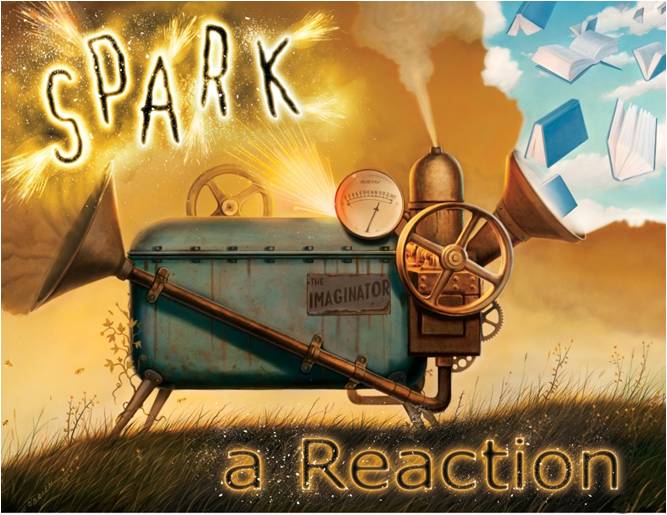 The Children’s and Teen/Tween clubs have a science theme that fits into the emphasis being placed on STEM education in schools. Many of the summer programs and activities planned for these age groups have a science or technology component. To learn more about our summer programs visit the library’s website at, www.wacolibrary.org
The Children’s and Teen/Tween clubs have a science theme that fits into the emphasis being placed on STEM education in schools. Many of the summer programs and activities planned for these age groups have a science or technology component. To learn more about our summer programs visit the library’s website at, www.wacolibrary.org
Sign-up for summer reading clubs begins at all libraries on Monday, June 2, and on Saturday, June 7 the Library will host a Family Fun Day from 1-4pm at the Central Library, 1717 Austin Ave. to kick-off our summer programs. Zooniversity will present a live animal program at 1:30pm and there will be fun for all ages including science experiment stations in the courtyard, teens constructing a 5 foot tall paper rollercoaster, snow cones, crafts and face painting.
 During June and July, support from the Friends of the Library helps provide for weekly Summer Showcase programming programs featuring guest performers at each library:
During June and July, support from the Friends of the Library helps provide for weekly Summer Showcase programming programs featuring guest performers at each library:
- Tuesday, East Waco at 9:30am and 10:30am
- Wednesday, West Waco at 10:30am and 1:30pm
- Thursday, Central at 10:30am and 1:30pm
- Friday, South Waco at 10:30am and 1:30pm
Family Night programming allows children and parents to attend summer showcase programming in the evening:
- Central Library – Tuesdays, June 17, 24 and July 1 at 7pm
- West Waco Library – Thursdays, July 10, 17, 24 and 31 at 7pm
The Angel Paws Reading Buddies program returns for another summer and allows children to practice their reading skills by reading to a furry, four-legged friend. These specially trained animal therapy dogs are great listeners who provide encouragement to reluctant and struggling readers while boosting their self-esteem during a 20 minute reading/craft session. Angel Paws will be at the Central Library on Monday evenings from 6:30-8pm and Wednesday mornings from 10:30am-12:30pm. Contact Vivian Rutherford at 254-750-5952 to schedule a 20 minute session.
For teens and tweens, programs will take place on Tuesday afternoons and Saturday afternoons and will include a variety of hands on science and craft programs. And zombies too!
This past week saw the passing of author and poet Maya Angelou. Of her many, many notable quotes, perhaps my favorite relating to libraries was one during a college commencement address while exhorting the graduates to read voraciously and to never stop learning she stated, “My encouragement to you is to go tomorrow to the library.“
This summer come to the library and – Read, Waco, Read!
 This Act Locally Waco blog post is by James Karney. James has worked in a library since his sophomore year in high school and is the Director of the Waco-McLennan County Library. He enjoys reading biographies, history, and spy/espionage novels. He has been married to the super amazing and talented Anita Karney for 20 years and their son Jamie will complete his sophomore year of high school on Friday – yikes!
This Act Locally Waco blog post is by James Karney. James has worked in a library since his sophomore year in high school and is the Director of the Waco-McLennan County Library. He enjoys reading biographies, history, and spy/espionage novels. He has been married to the super amazing and talented Anita Karney for 20 years and their son Jamie will complete his sophomore year of high school on Friday – yikes!
If you would like to write a post for the Act Locally Waco blog, please contact Ashley Thornton by email at [email protected] .
by Laura L. White, recent Baylor graduate
I may not drive the “coolest” of cars; it is a hefty station wagon that gets me from point A to B in a safe and timely manner. I have always been appreciative of this luxury, but after a recent experience, my appreciation has grown ten-fold.
On a Friday afternoon, I made an appointment at the McLennan Community College (MCC) Family Health Center to get a simple blood test. I decided to take public transportation to get there. The night before, I researched the bus route on the Waco Transit website. Let me just say, I can understand complex Organic Chemistry problems, but I could not seem to understand the bus system! After about 30 minutes I finally decided on my route.
My Spanish class ended at 2:10 pm and I immediately headed to the bus stop on 12th St. According to my research, a bus was supposed to arrive at 2:24, which would take me to the downtown Waco bus terminal by 3:10. From there, I would hop on a different bus line that would take me to MCC. According to these plans, I would arrive by 3:32pm. My appointment was at 4:30, so I thought I had plenty of buffer time.
I was at the bus stop by 2:20pm… and no bus came. Confused, I used my iPhone to call the main bus transit authority. The person who answered the phone explained that the bus I was expecting was not going to be making that stop. He redirected me to a different bus. I had to walk three blocks over and wait for another twenty minutes until the (free) Baylor Blue Line bus arrived.
We drove around the Baylor campus and various students got on and off. The bus then pulled up outside the gas station near 5th St. The bus driver instructed me that this was where I needed to get off to catch the next bus. I waited outside for another ten minutes until the new bus pulled up. I hopped on and asked the driver if he could take me to the main bus terminal. Unfortunately this bus did not stop there, but he said he could take me to within four blocks. He drove for about 25 minutes, then informed me that he was as close as he would be getting to the terminal, so I got off.
I walked the four blocks to the terminal. No one else was there, but I waited hopefully. More people started arriving, and after 30 minutes the bus finally pulled up.
The other two buses I had ridden had been filled with Baylor students. On this bus there were two young women with babies; an older gentleman who had difficulty walking and smelled of body odor and alcohol; a grandmother and her three-year-old granddaughter; and a young family of a mom, dad, and infant son.
Several other people got on the bus at the next few stops. By this point, it was almost 4pm and I could hear my stomach grumbling. I noticed several people pressing the button to request a stop. When the driver pulled over, I realized that we were outside of a McDonald’s. Half of the people on the bus got off at this stop! I always preach the importance of proper nutrition, and I have not eaten at McDonalds in years, but I had a feeling rush over me in that moment that all I wanted to do was to join them.
This experience made me almost ashamed of the lack of challenges I usually face in making healthy food choices. When I go to the grocery store, I purchase only fresh produce, meats, and dairy. Once I have all of my groceries, I load my car and go home. Now I realize how hard that process would be without a car. Carrying more than a few bags would be completely out of the question. And, if you are waiting a long time for the bus in the Texas heat, I’m sure that’s not the best for the milk, eggs, or vegetables you purchased.
As I said, after being on the bus for nearly two hours, I, Laura White who does not eat fast food, wanted nothing more than to stop in McDonald’s. If I were one of the young moms on the bus, eating an inexpensive meal while the children played in the safe environment of the play-area would seem like a completely wonderful plan. Needless to say, I now have a new appreciation of the difficulties people in poverty face when trying to lead a healthy lifestyle.
Finally, I heard the driver alert everyone that we were coming up to the MCC stop. I exited the bus, but having never been to this clinic, I wasn’t sure where it was. I aimlessly meandered through the parking lot until I found a person who gave me directions. I specifically remember her saying as I began walking away, “You definitely don’t want to walk all the way there. It’s really far. Just take your car.” A sinking feeling came over me and I politely responded, “I don’t have one. I took the bus. Thanks for the directions.”
The one thing this experience taught me—understanding. What would have taken me less than twenty minutes in a car, took me two hours and twenty minutes. I took three different buses and I had to walk well over a mile to get to my final destination. I am an able-bodied, well-educated, twenty-one year old woman and I still left this experience with frustration and exhaustion. What if I had a physical disability, or if I were elderly, or if it was a day of extreme weather? I challenge any physician that reschedules a patient’s appointment because of tardiness to rethink what might have led to the patient’s late arrival. There could be more to the story…
Note: The Waco Metropolitan Planning Organization (MPO) is in the process of identifying transportation needs for Metropolitan Waco through the year 2040. They have invited all interested people to make their priorities known. You can submit feedback in writing until June 15. Suggestions may be submitted by fax at (254) 750-1605, by e-mail to [email protected] or by mail directed to Christopher Evilia at the following address: Waco Metropolitan Planning Organization, P.O. Box 2570, Waco, Texas 76702-2570. Please take a moment to urge them to make improving public transportation a priority. Transportation is an important issue for all of us!
 This post was written by Laura White from Warren, NJ. She just graduated from Baylor University in May with a Bachelors of Science in Biology. She remains in Waco, TX for the upcoming year to serve as an AmeriCorps member working within the Family Health Center clinics. After once year of service, she hopes to attend medical school in Texas to ultimately pursue a career in Family Medicine. She was inspired to ride the bus by her experience volunteering at the Family Health Center as a part of her Family Medicine and Community Healthcare Course at Baylor University. If you would be interested in writing a post for the Act Locally Waco blog, please email [email protected].
This post was written by Laura White from Warren, NJ. She just graduated from Baylor University in May with a Bachelors of Science in Biology. She remains in Waco, TX for the upcoming year to serve as an AmeriCorps member working within the Family Health Center clinics. After once year of service, she hopes to attend medical school in Texas to ultimately pursue a career in Family Medicine. She was inspired to ride the bus by her experience volunteering at the Family Health Center as a part of her Family Medicine and Community Healthcare Course at Baylor University. If you would be interested in writing a post for the Act Locally Waco blog, please email [email protected].
by Phil York, Act Locally Waco Housing and Homelessness Policy blogger
Since the post-holiday season, we have used the motif of unwrapping gifts to understand some of the dimensions of housing and homelessness.
We started our discussion with a definition of homelessness through Housing and Urban Development (the federal agency that administers national housing programs). We then discussed how this definition is applied to children, veterans and our other neighbors who may not have a home.
The purpose of our conversation is to keep us all informed: we need to be aware of how decisions made in Washington affect our lives in Waco.
We can use the lessons learned over the past few months and apply them to the latest update from Washington. Let us use our knowledge-base to unwrap:
- The basics of the proposed legislation
- Possible local implications of the proposed legislation
- Ways we can continue our collective efforts to build a stronger Waco
The Basics of the Proposed Legislation:
The U.S. House of Representatives Fiscal Year 2015 Transportation, Housing and Urban Development (THUD) bill is scheduled for House Appropriations Mark-up next week.
Here are the basics about the bill (a paraphrased summary provided by CSH – A Housing Policy and Advocacy Group (www.csh.org )):
- Overall, the House version of the FY2015 THUD Appropriations bill would decrease funding for HUD by $769 million from the FY2014 levels.
- The bill flat funds the Homelessness Assistance Grant programs, providing $2.1 billion. It did not accept the $300 million increase proposed by President Obama.
- There is a slight increase in Housing Choice Voucher program; however, the funding provided does not restore the 40,000 vouchers that were lost to sequestration.
- Funding for the HOME program cut by $300 million.
The U.S. House of Representatives Committee reports specifically about the Community Planning and Development program with the following update in a May press release:
“The bill contains $6.2 billion for Community Planning and Development programs – a reduction of $383 million below the fiscal year 2014 enacted level. The Community Development Block Grant formula program is funded at $3 billion – effectively equal to last year’s level – while the HOME Investment Partnerships Program is funded at $700 million, a reduction of $300 million below the fiscal year 2014 enacted level.
Subcommittee Chairman Tom Latham provided the following commentary about the proposed bill:
“My priorities in this process were to act in a bipartisan fashion to fund our most vital programs with our critical need to reduce the deficit. This is a sound, commonsense bill that meets our highest transportation and housing priorities in a fiscally responsible way. I look forward to working with my colleagues on both sides of the aisle to move this important legislation forward in an open legislative process.”
Possible Local Implications of the Proposed Legislation:
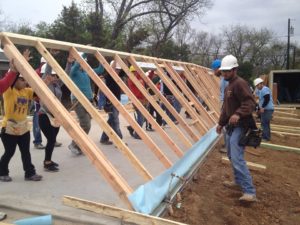 Waco Habitat is just one of many organizations that partner with the City of Waco to build a stronger Waco with the programs described above. Here are a few ways Waco Habitat used these precious public dollars to improve our community:
Waco Habitat is just one of many organizations that partner with the City of Waco to build a stronger Waco with the programs described above. Here are a few ways Waco Habitat used these precious public dollars to improve our community:
ReStore:
- By using Community Development Block Grant (CDBG) funds through a zero percent loan (that was paid back within three years), the Waco economy has been greatly impacted for the good.
- ReStore offers affordable building materials to people in our community, recycles products thus diverting them from the landfill, and supports administrative efforts of our organization.
- ReStore diverts 3,000 tons from the landfill annually and saves the city about $164,000. The net income from ReStore assures donors to Waco Habitat that 100% of their gift goes to build and repair homes in our community.
New Home Construction Program:
- We are concerned that funding levels proposed in the FY 2015 House THUD bill will make it more difficult for us to serve people living at 30% to 60% area median family income.
- Without HOME funds our partnership housing ministry would be greatly thwarted. Since 1999, Waco Habitat for Humanity has served as a Community Housing Development Organization.
- With over $3.1 million, we have built 48 houses.
- Home ownership assures about seven new home owners join the tax paying roles each year.
- Home ownership adds to the tax base of our community, improves schools, enhances professional opportunities, strengthens school performance, expands likelihood of graduation, and spreads hope for future generations.
Habitat achieved the above accomplishments thanks to our public fund partnerships. Budget cuts today affect Waco’s ability to realize a community where everyone has a decent place to live.
Ways We Can Continue Our Collective Efforts to Build a Stronger Waco:
- Remain informed: The most important call to action is for us to remain informed about the current policy landscape. Regardless of your political background or interest, we share common ground in the preservation and long term health of Waco. Follow the work of the US Committee on Appropriations: http://appropriations.house.gov/news/.
- Have your voice heard: Contact your U.S. House representative. Please provide your Representative with the talking points provided above. If your Representative is Mr. Bill Flores, you have the convenience to contact Rep Bill Flores directly via email (https://billflores.house.gov/contact/ ).
- Connect directly to the mission: There are volunteer opportunities at Habitat and other nonprofit organizations that work directly with our neighbors in need. These organizations offer opportunities for you to give of your time and talent.
Your donations, whether they be of time or money, are important – they bind us together. Once connected, we may share the urgency of the above implications and collectively move our leadership to join us as we build a stronger Waco together.
 Phil York, Director of Development at Waco Habitat for Humanity, is a self-described “policy nerd;” he is also the Act Locally Waco housing and homelessness policy blogger. You can direct questions to Phil to [email protected]. Would you be interested in blogging for Act Locally Waco? If so please email [email protected].
Phil York, Director of Development at Waco Habitat for Humanity, is a self-described “policy nerd;” he is also the Act Locally Waco housing and homelessness policy blogger. You can direct questions to Phil to [email protected]. Would you be interested in blogging for Act Locally Waco? If so please email [email protected].
